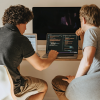
Bing in the classroom
I’ve taught high school. It’s a hazard zone. Anything that can be done to remove even the tiniest temptation or negative influence should be done, and Bing has now introduced an advertisement free search product geared to schools. Most are focused on the technology offered, but there are greater implications here.
No one is naïve enough to think that eliminating advertisements from searches is going to conquer the teenager at his game; he can still hack a computer, bypass security measures, and be watching YouTube videos by the time the tardy bell rings, but that doesn’t mean that because this is a small change that it isn’t a needed one.
Throughout the years, schools have booted out advertising in many ways. When I was younger, there was a movement to alter the school dress code to ban t-shirts with advertising. Corona had a line of t-shirts in the early nineties that caused quite a fuss at my school. The t-shirts were banned from being worn at any school function. The problem was that apparel boasting the name Corona was expensive, and parents were mad that they’d dropped crazy cash on a t-shirt that kids were no longer allowed to wear.
The rip it out campaign
Then there was the campaign that encouraged kids and adults alike to rip out tobacco advertisements from magazines. It encouraged us to not only rip out ads from our own periodicals, but it also suggested that we rip up magazines in doctor’s offices, hair salons, airplanes, etc. At first glance, the campaign was about calling attention to the dangers of tobacco, but the real motivation was literacy. Kids should be able to read magazine without being tempted by sly marketing.
Bing’s latest project is just the modern day version of the rip it out idea. We aren’t just exposed to the internet as a research tool anymore. It is the foundation of teaching in that every classroom everyday relies on it in some way. Some may say that if kids aren’t exposed to advertisement at school, they will come across it someplace else, but the idea is, much like the magazine idea, it’s essence is being able to offer a learning experience that isn’t tainted with advertisements that could lead kids away from time on task.
Bing it on. Any push for safer education is a push for a greater tomorrow.
Kristyl Barron holds a BA in English Education from the University of Central Oklahoma and an MHR in Counseling/Organizational Management from the University of Oklahoma. Barron has been writing professionally since 2008, and projects include a memoir entitled Give Your Brother Back His Barbie and an in progress motivational book called Aspies Among Us.











































